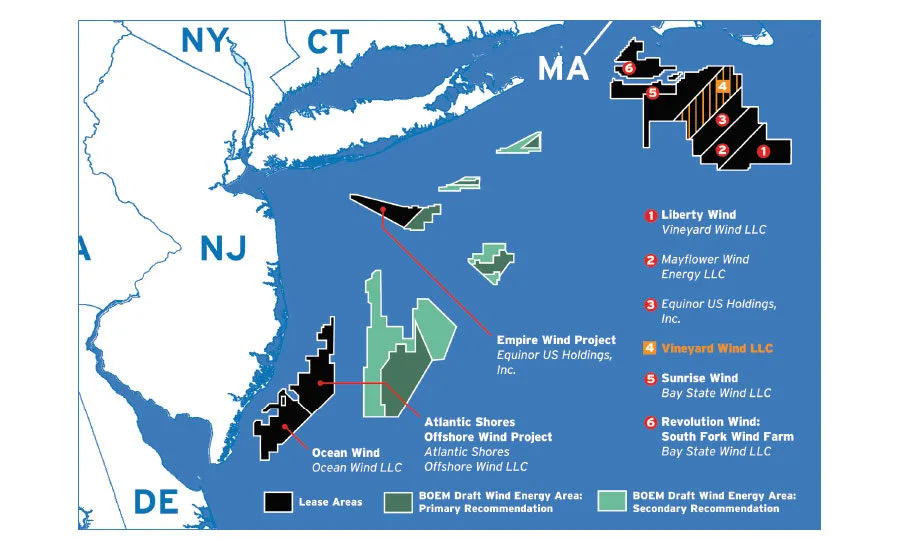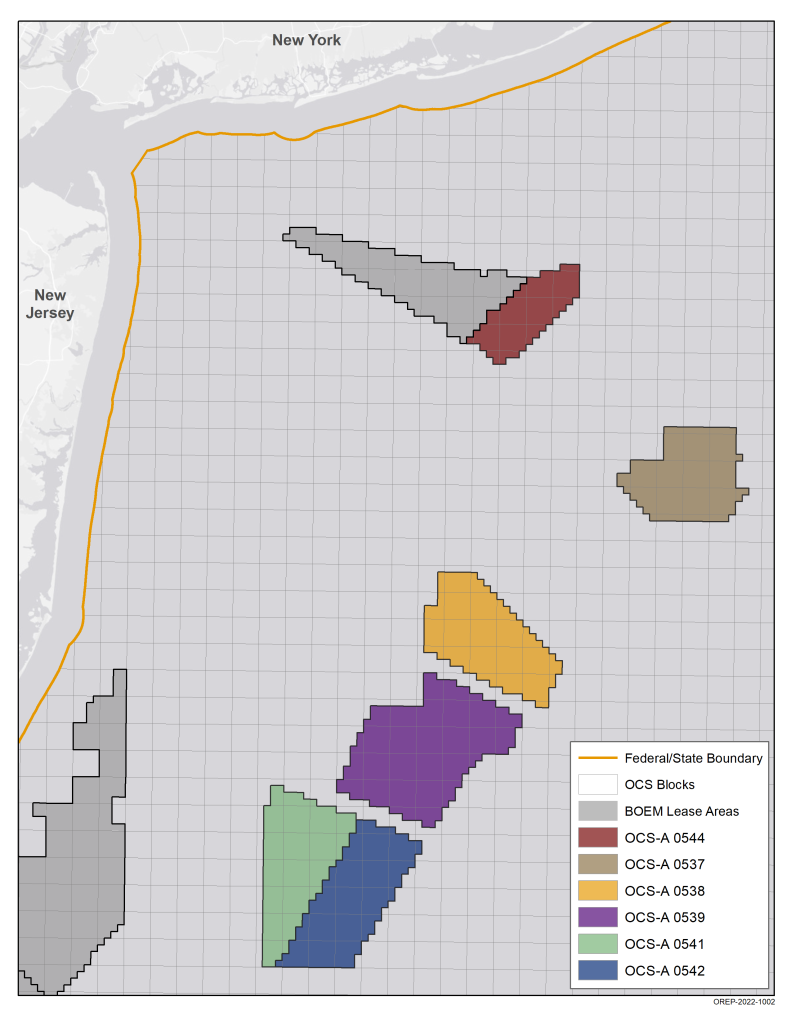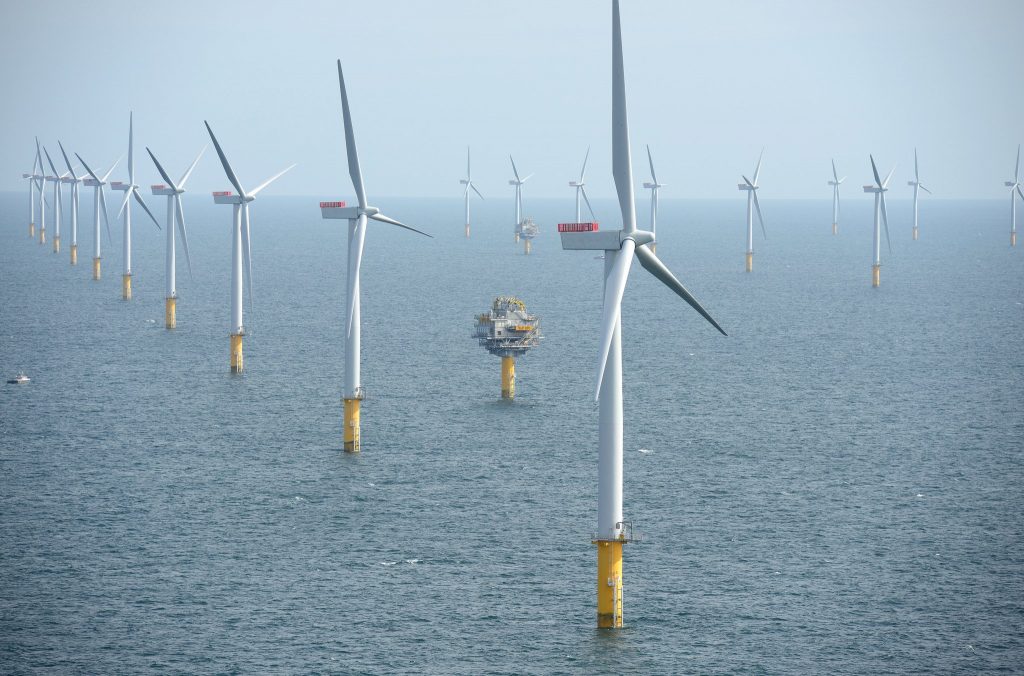The administration of Gov. Phil Murphy on Thursday announced several measures aimed at expanding offshore wind farms off the New Jersey coast, just as a battle begins to heat up in southern Ocean County over what some residents complain will be a detriment to their ocean views.
Long Beach Island is, literally, dotted with protest signs in opposition to an offshore wind project every few feet along its main thoroughfares and front lawns. An offshore wind project being planned in an area that has already completed its federal leasing requirements will run from Cape May to about the mid-point of the island, located just 9-miles offshore – within clear site of beachgoers. The northern half of that project, known as the “Atlantic Shores” site, will consist of about 357 turbines.
This week, the Murphy administration announced it would fund additional research projects to promote more offshore wind development.
For Ocean County’s northern barrier island, it is doubtful – at least presently – that any wind farm will be located within eyeshot of the shoreline. Newly-proposed lease areas off northern Ocean County are located about 30 miles from shore, though they are still positioned closer than similar developments in Europe, which are generally sited between 35 and 50 miles from inhabited coastlines. The federal Bureau of Ocean Energy Management has labeled the area closest to the northern Ocean County “OCS-A-0538.”
This area, as well as several others adjacent to it – but farther from shore – were bid out in Feb. 2022. New Jersey will hold its own project solicitations in the first quarter of 2023 to determine the size and scope of projects that will be built in the federal lease areas.
Murphy, a Democrat, received significant endorsements in his gubernatorial campaign from environmental groups, including those in support of offshore wind projects. He has also largely followed California’s lead in passing executive orders setting numerical goals for offshore wind and renewable energy implementation by certain dates. This week, he signed a new executive order increasing New Jersey’s offshore wind goal by nearly 50 percent to 11,000 megawatts by 2040. The order, which increases the state’s current goal of 7,500 mw, also directs the New Jersey Board of Public Utilities to study the feasibility of increasing the target further.
Murphy also released a report detailing positive economic impacts of offshore wind development, largely published with the input of industry lobbying groups, environmental advocates and organized labor. He made a slew of announcements alongside New York Acting Governor Kathy Hochul, who is campaigning to replace Andrew Cuomo as the elected governor, at a climate change event in Manhattan.
The administration will appropriate several million dollars toward academic studies on offshore wind.
- The Clean Energy and Sustainability Analytics Center at Montclair State University has been awarded $440,000 to assess the potential impacts of offshore wind energy on New Jersey’s recreational fishing industry. The researchers will conduct a survey of recreational anglers as part of a broader effort to estimate potential impacts to an industry that is an important driver of local economies.
- Monmouth University and the New England Aquarium have been awarded $1.9 million to use acoustic telemetry to track fish movements along New Jersey’s coastline and in offshore wind lease areas. Species of interest – including endangered species and those that are important to commercial and recreational fishing – will be tagged with transmitters. Receivers placed strategically on the seabed will record their movements. The project will provide baseline data and become part of a larger acoustic telemetry network along the Eastern seaboard.
- Allocation of $500,000 for deployment of passive acoustic monitoring systems on the seafloor to record the calls of baleen whale species, including the endangered North Atlantic right whale, to better understand the movements and behaviors of these animals. RMI will issue a contract for deployment of the equipment in the near future. Through this project, New Jersey will join a collaborative effort to support establishment of a regional detection network to avoid, minimize, and mitigate potential impacts on these animals during the construction and operation of offshore wind farms.
- A team from Rutgers University, Monmouth University, the National Renewable Energy Lab, and the Special Initiative on Offshore Wind was awarded $285,000 to explore the potential use of offshore wind farms turbines, foundations, and substations as potential environmental and ecological monitoring platforms. This team will also gather input from a broad range of stakeholders to develop a conceptual plan for a regional network of environmental and ecological monitoring systems that would provide high-quality data on environmental and ecological conditions, commercial and recreational fisheries, and marine safety.
The projects are supported through a $26 million fund administered by the state that received initial funding from two offshore wind developers as part of the BPU’s second offshore wind solicitation award.
“Development of offshore wind energy is a vital component of the Murphy Administration’s work to mitigate and respond to the worsening impacts of climate change,” said Commissioner of Environmental Protection Shawn M. LaTourette. “This round of projects will gather critical baseline scientific information that will help ensure the responsible development and operation of offshore wind facilities that protect our coastline and its natural resources that are precious to all of us.”

Advertisement

Police, Fire & Courts
Former Ocean County Teacher Sentenced to Parole for Relationship With Student














